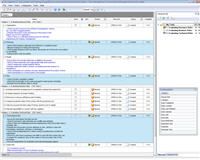 |
Risk is a potential probability of suffering loss. In project development, the loss assumes the impact to the project which could be in the form of reduced quality, extra costs, procrastination, or even failure. Risk Management is a complex of methods and controlling measures aimed to prevent risks and reduce their negative consequences over the project. Use Risk Management Checklist to find out what type of risks you should manage and, therefore, to eliminate or minimize risk outcomes.
|
| Order 750 checklists in MS Word and PDF printable format at $49.99 USD only. |
BUY NOW!  |
1. Evaluating Resource Risks
1.1 Organization
- Check if project resources are sufficient (management, test ers, QA, and other engaged parties)
- Estimate the project scope and find out if the project is the largest one for the organization
- Check if there is a well-determined process for software engineering and company management
1.2 Financing
- Check if the funding is adequate and sufficient to complete project
- Allocate funding for training and mentoring
- Check budget limitations that can deliver the project at a fixed cost or be subject to cancellation
- Assess project costs accurately
1.3 People
- Ensure there are enough employees available in the project
- Check if these employees have appropriate skills and experience
- Check if employees worked together before
- Estimate employees' belief in project succeeding and take measure to strengthen it
- Check participation of customer and user representatives for product reviews
- Check participation of crucial experts in the project
1.4 Time
- Check if project schedule is realistic
- Check the functionality to be scope-managed to meet project schedules
- Estimate how the delivery date is critical
2. Evaluating Business Risks
- Estimate potential consequences if a competitor reaches the market first
- Evaluate jeopardy of project funding
- Find ways to ensure sufficient project funding
- Compare projected value of the system with the projected cost
- Take into account the time-value of money and the cost of capital
- Estimate impossibility to contact with key suppliers
3. Evaluating Technical Risks
3.1 Scope risks
- Try to measure success
- Make documentation on how to measure success
- Assure requirements properly designed and well understood by staff
- Check if the project scope is stable or it keeps expanding
- Check if the project development time scales are short and unalterable
3. 2 Technological risks
- Assure the technology has been proven
- Check if transaction rate estimates are credible and optimistic
- Check if there are challenging technical requirements which the project team is unfamiliar with
- Estimate how the project success depends on ...
|